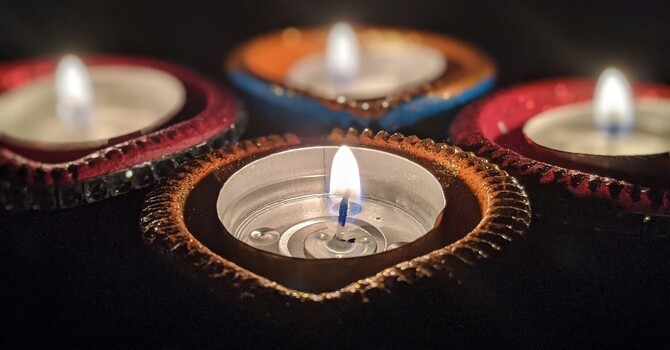
Some days, the world just feels like a lot. Even if your own life is relatively steady, the weight of what’s happening around you—globally, nationally or locally—can quietly wear you down.
You might struggle to concentrate. You may feel tired, flat, reactive, or disconnected. Maybe there’s a quiet hum of sadness, anger, or confusion running in the background. It might not be loud—but it’s there.
Many of us feel deeply impacted by things that don’t directly touch us. You hear difficult news. You absorb the emotional energy in your environment. You feel the ripple effects of uncertainty—and all of it settles somewhere in your body and mind. If you’re the kind of person who stays steady for others or is known for being calm and capable, you might not even realize how much you’re carrying until something pushes you over the edge.
When You’re Carrying More Than You Realize
You might be doing all the things you're "supposed" to do—showing up for work, replying to messages, getting through your list—while quietly holding onto emotions no one else can see.
It might feel like:
- A sense of sadness or anger
- Mental fog or emotional confusion
- Feeling out of sync with people around you
- Questioning whether the world still makes sense
Even if you’re not talking about it, what’s happening inside you is real. And it’s a valid response to something that matters.
When What You Believed No Longer Feels True
Sometimes something shifts in how you see the world. A belief, system, or story you once trusted no longer holds the same meaning. That kind of reckoning can leave you feeling disoriented and unsteady.
There’s no quick way through it. No immediate clarity. Just the slow, painful sense that something feels broken—and you’re not sure how to put it back together.
When the People Around You Don’t Feel It the Same Way
One of the hardest things about collective pain is discovering that others may not feel it the way you do. Maybe they carry on like nothing happened. Maybe they disagree entirely. And if they’re people you once felt aligned with, that difference can be especially painful.
You might find yourself wondering:
How can they not feel this too?
What does this mean for our relationship now?
That disconnect can shake your sense of safety or belonging. It can make you question where you fit, or who really understands you.
Two Common Responses to Emotional Overload
When life feels heavy—whether from personal stress or the weight of the world—people often slip into one of two coping styles:
- Shutting Down: This looks like disconnecting from your feelings because they feel too overwhelming. You might zone out, bury yourself in distractions, or push your emotions away to deal with later (if ever). While this can offer temporary relief, it often leaves you feeling distant, unresolved, or stuck.
- Overfunctioning: This means doing more to stay in control. You take on extra tasks, focus on fixing everything, or make sure everyone else is okay—without realizing it’s coming from overwhelm, not empowerment. It might look productive, but it often leads to exhaustion and emotional burnout.
Both are common. Both come from trying to survive emotional overload. But when either becomes your only way of coping, it can leave you feeling more depleted than supported.
How to Come Back to Yourself
You don’t have to "fix" how you feel. But you can take small, intentional steps that help you feel more grounded—without numbing out or spiraling.
Here are a few gentle ways to begin:
- Take a break from the feed: Even a short digital detox can help clear your head. The key is choosing the break intentionally—not just to avoid your feelings, but to create space for clarity and calm.
- Let something go: Cancel a plan. Move a task to tomorrow. Cross one thing off your list. You don’t have to do it all, and releasing pressure (without guilt) is a powerful act of care.
- Do something grounding: Step outside. Make a warm drink. Take a slow walk. These aren’t distractions—they’re ways to reconnect with the present moment and return to your body.
- Talk to someone who gets it: A supportive conversation can lighten the emotional load. It’s not just venting—it’s about feeling seen, which can help you process what’s going on and remember you’re not alone.
- Choose a healthy distraction: Watch a comfort show. Cook a familiar meal. Start a simple creative project. The goal here isn’t to avoid emotion, but to give your mind a moment to rest and recharge.
Take action where you can
While small, immediate steps help to regain balance in the moment, longer-term actions can help create a sense of agency and purpose. Whether it’s standing up for a cause, helping those in need, or supporting positive change—taking action can help you feel like you’re contributing to something greater. Even something as simple as reaching out to a friend who’s struggling can be a meaningful action.
Redirect Your Focus
We all cope in different ways, and it's just as valuable to redirect your focus to what’s within your immediate reach: your home, your relationships, the people you love. These constants can offer comfort and stability, even when everything else feels uncertain.
Take a moment to acknowledge what’s good in your life—your blessings, your joys, your sources of love and connection. Cultivating gratitude for these small but meaningful things doesn’t erase the heaviness of the world, but it can give you space to breathe, recharge, and find peace in the things that matter most to you.
If This Is You
You don’t need to justify how you feel.
You don’t need to perform being okay.
You can be quiet.
You can be angry.
You can care deeply without needing to explain it.
You can fall apart a little—even if nothing around you has.
If things feel heavy, it’s because they are.
And if it’s hitting you hard, that doesn’t make you weak.
It means you're human.
It means you're connected to something that matters.







